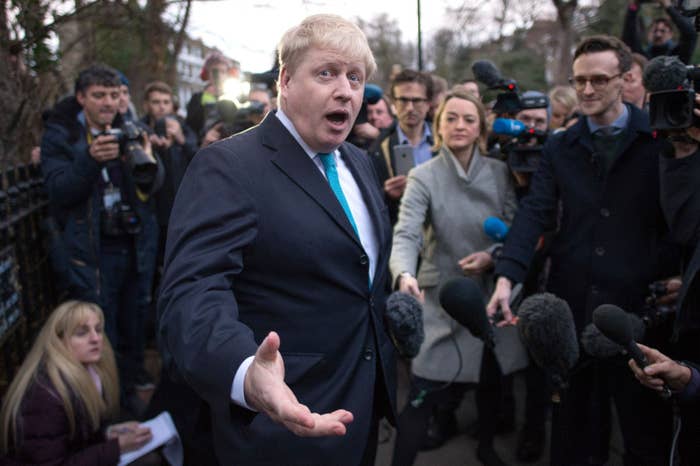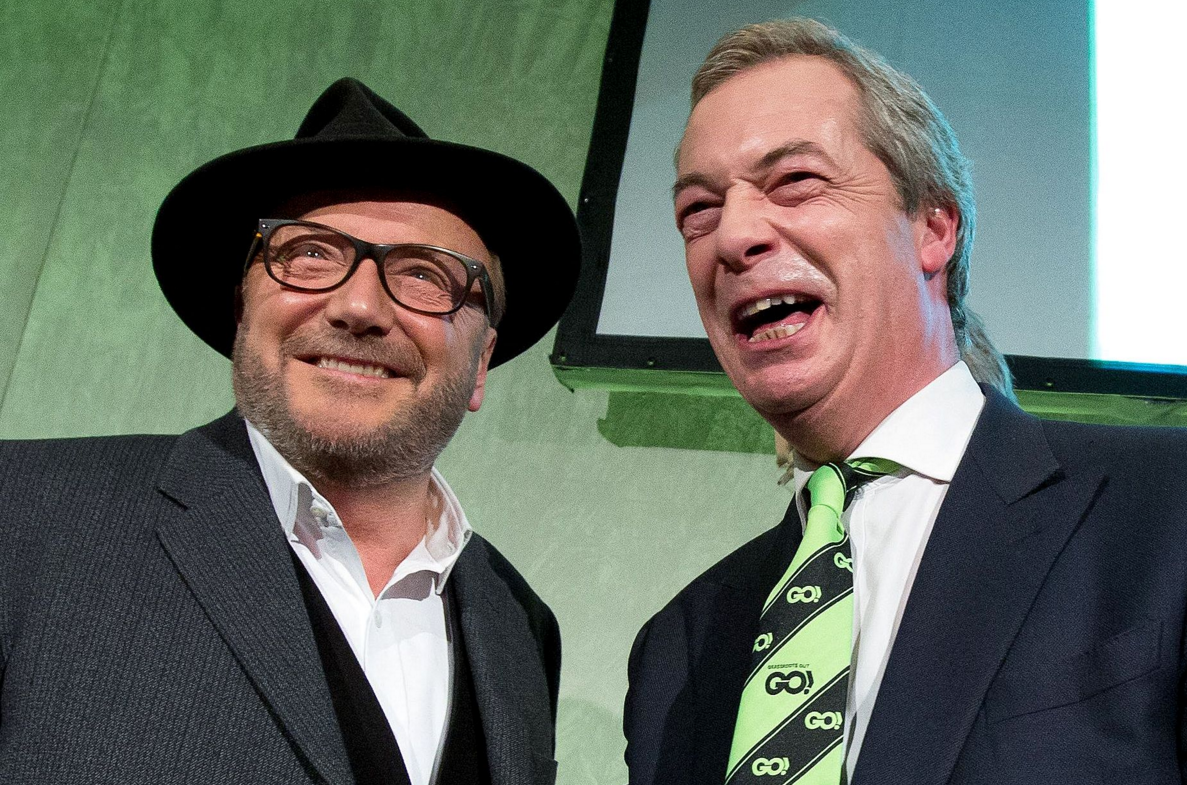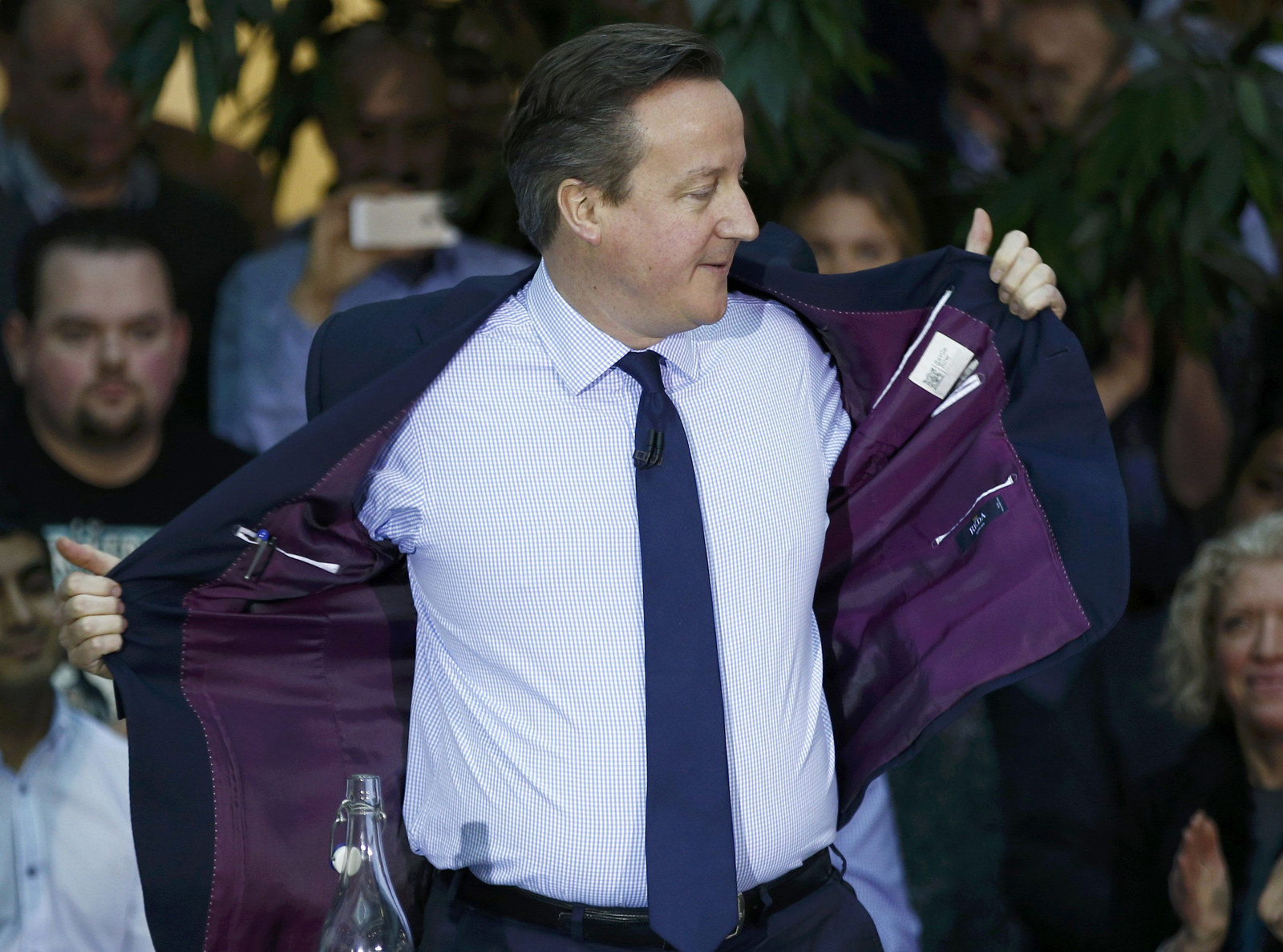
Arron Banks is absolutely delighted with the chaos of the first 72 hours of the EU referendum campaign.
“When Nigel Farage introduced George Galloway, half the people in the audience stood on their chairs,” the founder of the Leave.EU campaign chuckles, recalling a big anti-EU event staged in London on Friday night. "I thought the place was going to explode. There were people being dragged out of the hall."
The rally, timed to coincide with David Cameron’s last-minute negotiations with other member states before he called the referendum on Saturday morning, was the moment the proxy war between the Leave and Remain campaigns became real. And it’s only going to get worse, especially thanks to the winner-takes-all battle between the two rival organisations vying to be legally designated as the official Leave campaign: Vote Leave, which has the backing of Conservative cabinet ministers, and the UKIP-associated outsiders at Banks's Leave.EU.
Now there’s no need for any more debate over the terms of the renegotiation, the next four months will be about actually convincing voters. Which means the three individual campaigns – Vote Leave, Leave.EU, and, on the Remain side, Britain Stronger in Europe – have had to change tactics, whether by collecting the signatures of FTSE 100 chief executives for open letters or attempting to fatally undermine rival campaigns.
For Vote Leave, the first three days of the real referendum campaign were about ensuring nothing went unchallenged.
“We made a big thing about making this 72-hour period after the negotiation something we needed to win," says a spokesperson, "so every time there was a pro-EU voice there was another voice." This meant rapid rebuttal and getting a voice – almost any voice – on TV or radio or online whenever a pro-EU comment hit the air.
None of those voices were louder than that of Boris Johnson. The campaign is thought to have had some advance knowledge of Michael Gove’s declaration on the Saturday that he would support leaving the EU (Vote Leave is partly run by Dominic Cummings, Gove’s notorious former special adviser), but sources insist Vote Leave was still not completely certain the mayor of London would formally declare for Leave until Sunday afternoon.
As a result, some of the organisation’s staff took to turning up on his doorstep and debating whether he would take kindly to having a Vote Leave-branded umbrellas dropped on the doorstep. Eventually they went for it – and were only certain it was the correct call when they read a tweet from the BBC’s Laura Kuenssberg saying Johnson would go for it.
Vote Leave quick off the mark. They have left a brolly and a hat outside Boris's front door.
For Vote Leave, a major success was getting the mayor’s near word-for-word repetition of its “Vote Leave, Take Control” slogan on the front page of Monday’s Metro. The free newspaper is perceived as influential because it's read by millions of floating voters with less firmly fixed views about politics than the readers of other papers.
Monday's Metro front page: 'It's time to take control' #tomorrowspaperstoday #bbcpapers #euref
“I think you might say the Metro front page was a lovely thing to see,” says a spokesperson. “Even when it’s not [an official] Vote Leave spokesman saying it, it's the messaging from the Eurosceptic side. As weeks go on we will expand and land punches on the government in the air war but also campaign damn hard on the ground.”
The problem is, only one organisation will be designated as the official anti-EU campaign by the Electoral Commission and thus be allowed to spend up to £7 million on campaigning. This will be done on strict criteria, but it was never truly envisaged that there would be two relatively credible rivals for designation. Banks is confident his more ragtag campaign – which, under the name Grassroots Out, takes in everyone from Respect’s George Galloway to Nigel Farage via a small collection of Labour MPs – is the one that can truly claim to represent the full spectrum of Eurosceptic support, while Vote Leave is reliant on big Tory names.
So for Banks, the short-term focus is now against Dominic Cummings and Vote Leave for the formal designation and the chance to shape the anti-EU campaign around an anti-immigration narrative.
“The Electoral Commission has a set of guidelines and you could have 6,000 Tory MPs and it wouldn’t make a difference,” Banks says. “Cummings is not as bright as he thinks he is. He’s not bothered to read the rules.”
He claims to be in discussions with more Labour figures, as he’s aware Grassroots Out needs more left-wing supporters to join alongside Galloway. “We have to play up the campaign more from the left than the right," Banks says. "We had a very, very senior Labour figure come to us the other night and say, ‘I’m an Outer but [Gove and Iain Duncan Smith] make me want to be an Inner.’”
Banks says the Labour figure went on to complain that Vote Leave is a ‘fucking Tory front’.
“No Labour or trade union people can join Vote Leave now," Banks says. "It’s just a proxy battle for the Tory leadership."

He's promising a national Grassroots Out tour, including a major event in Birmingham’s NEC at the start of May that he insists will be the “biggest rally in peacetime Britain”, and has plans to bus in Eurosceptics from other countries: “I’m quite enamoured with [the idea of] posting adverts all Europe and inviting all the French, German Eurosceptics to join a massive rally in London.”
For its part, Vote Leave won’t even engage publicly with Banks and Leave.EU. “We wish Arron well,” a spokesperson replies patiently when asked whether there’s any future for the two campaigns to work together.
No chance of making up? "We wish Arron well,” the Vote Leave spokesperson repeats.
Meanwhile, the world of Britain Stronger in Europe, the pro-EU campaign, is positively balmy. Founded last summer, Stronger In admits it’s a much looser coalition than its rivals on the anti-EU side.
"The big difference in terms of the campaigning is that as of the weekend the prime minister has been very clear he is campaigning to remain in the EU and so are most of the cabinet," says a Stronger In campaign source. "It’s not just going to be us as a campaign making the case. You’re going to have the prime minister and other government figures focused on the referendum."

This more disparate organisation is in part due to the reticence of the UK’s major parties to pool their resources following their experience with Better Together, the campaign to keep Scotland in the UK during the Scottish independence referendum, which saw Labour tarred by its decision to work alongside the Liberal Democrats and the Conservatives. (Another concern is parties sharing crucial data they’ve built up on individual voters that could then be accessed by rival parties.)
But thanks to the prime minister’s decision to break the pretence that he might campaign to leave the EU, the campaign can now start deploying Conservative figures who until now had to remain nominally on the fence while waiting for the formal end to the renegotiation process.
The initial plan is to spend the next four months repeating a similar safety-first message to the one that delivered the 2015 general election for David Cameron’s Conservatives: “This week in particular we’re going to move to the big issues: the economy, security, then Britain’s leadership in the world. Those three pillars aren’t going to change."
UK employers are clear: leaving the EU 'puts jobs at risk'. UK families are #StrongerIn https://t.co/ArqHfWxMLf
Although Cameron is now officially on board, the extent of Downing Street’s day-to-day involvement in Stronger In – where several key staff are Labour or Lib Dem activists – is still up in the air: “It’s going to take a bit of time to work out who does what,” says a campaign source. “We’re not trying to be a command-and-control campaign like Better Together – we won’t have the official party campaigns embedded in our campaign. We’ll support people: We’ll be doing things, the government will be doing stuff, Labour will be doing things.”
But unlike the rival anti-EU campaigns, the team at Stronger In can at least relax and know they have a clear run to get official designation from the Electoral Commission for the official Remain campaign. In the meantime, they want to focus on message discipline and exploiting the chaos on the Leave side. As one source says: “The other side of the argument are divided and fighting like rats in a sack."
